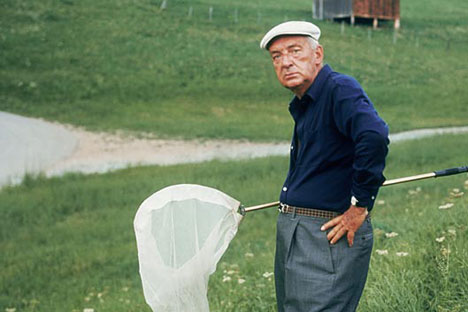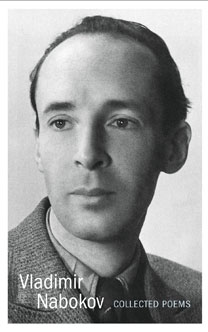
Vladimir Nabokov, a novelist, poet and translator. Source: Photoshot / LegionMedia.
Novelist Vladimir Nabokov, celebrated for masterpieces in Russian and in English including “Lolita” and “Pale Fire,” was ashamed of his juvenile attempts at poetry. He referred, in his 1970 collection “Poems and Problems”to “the steady mass of verse which I began to exude in my youth … with monstrous regularity.”
Judging by a new book, surveying six decades of Nabokov’s poetic output, he was right to be embarrassed about his early works.
Most teenage versifying is best forgotten, and to open the volume with “Music,” which Nabokov wrote when he was fifteen, gives a ridiculous impression of the writer’s skills, and of his son Dmitri’s powers of translation. The repetition of archaic verbs like “plashing” and clichéd similes “like diamonds” must have made the older Nabokov wince.
 |
| Vladimir Nabokov, Collected poems, Penguin Classics, 2012. |
Ten years later, he still offers lines like “fleetingly shimmered ineffable echoes/ of a vibrant nightingale,” but the mature novelist’s pitch-perfect ear for tone and metaphor becomes evident in the playful, later poems, especially those written in English; even here he is hamstrung by strict rhyme-schemes and a formal conservatism at odds with the radical originality of his novels.
Dmitri Nabokov’s translations don’t always do justice to the Russian poems. To dispense with rhymes is excusable (even necessary), but to translate into lines that do not scan distorts the aural grace of the original.
Despite all this, the autobiographical intimacies in this book will fascinate Nabokov’s fans. He writes movingly and perceptively about language, memory, identity and exile.
In “Poems and Problems” he identified the different stages of his own early poetic career, moving from verses of love and politics through nostalgia to narrative. Examples from each of these phases are represented, together with the “robust style” of his later poems.
“The University Poem,” written in 1926 and published here for the first time in English, recalls Nabokov’s student years in Cambridge. It uses the meter and verse form of Pushkin’s “Eugene Onegin” to produce an ambivalent evocation of a rainy market town, and an ironic parody, reminiscent of “Pale Fire.”
One of several tropes familiar from the novels is the shifting and self-alienated persona of the narrator. Here he sees himself as the exotic émigré, through the eyes of Violet, a local girl he meets while at tea with the vicar. “It’s the first time / I have met a Russian.”
As in many of the poems, there are comic elements, like Violet’s serial affairs with “Jim, the soccer star” or “Joe, the pensive one”; there is also homesickness, wistful or violent, triggered by sunsets, mosquitoes, rare snowy days, or finding books by Pushkin and Dahl, the Russian lexicographer, on a book stall.
Language, as a theme, haunts both the Russian and the English parts of this anthology. Nabokov was a prolific translator and there are several poems that play on his bilingualism. In his parodic poem about translating “Onegin,” he laments “Elusive Pushkin! Persevering, / I still pick up Tatiana’s earring.”
In the brilliant “Evening of Russian Poetry,” the narrator talks about “customary” rhymes in Russian: “love automatically rhymes with blood, / nature with liberty, sadness with distance…”
His native language is animated: “I hear the neighing of my dappled nouns.” Throughout the poem, the speaker patiently answers questions from the audience until, at the end, they ask him to tell them the Russian for “delightful talk … good night” and he mistranslates “Bessonnitza tvoy vzor oonyl i strashen … (Insomnia, your stare is dull and ashen…).”
Poetic Nabokov at his best achieves a subtle sublimity. He explores the writer’s dual existence, as fallible human and as immortal creator. In a poem about Shakespeare, he contrasts the Elizabethan playwright “who lived in pubs” with the “hundred-mouthed, unthinkably great bard.”
Similarly, Tolstoy is at once a disgruntled, nondescript old man, “his beard disheveled by the wind”, and a god-like creator, conjuring “a Russia of smells, of nuances, of sounds…” In these poems, Nabokov too reveals his creative strengths and his all-too-human weaknesses.
All rights reserved by Rossiyskaya Gazeta.
Subscribe
to our newsletter!
Get the week's best stories straight to your inbox